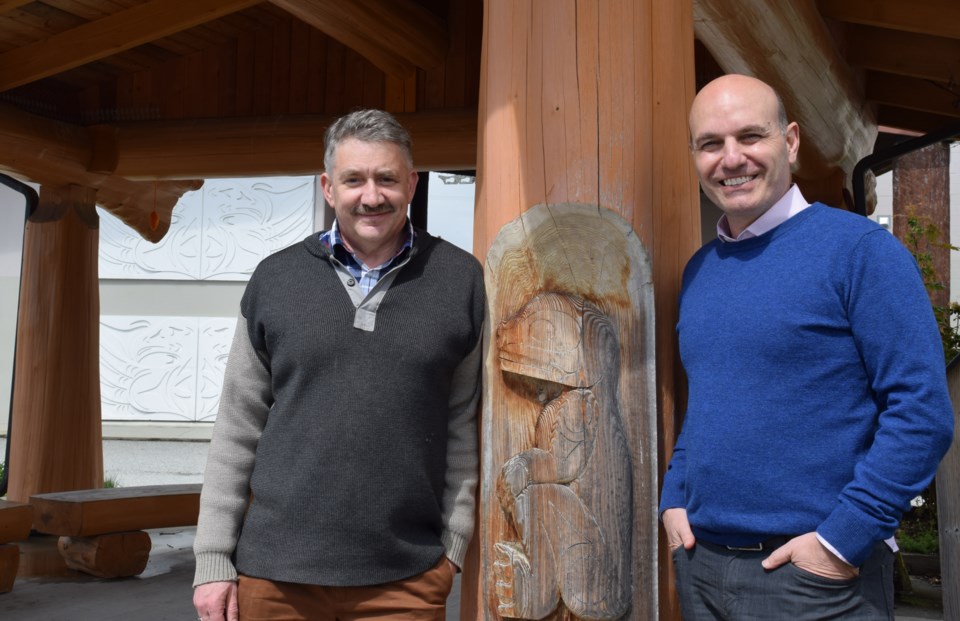Provincial ministers of Water, Land and Resource Stewardship; and Indigenous Relations and Reconciliation, Nathan Cullen and Murray Rankin, along with local MLA Nicholas Simons and representatives of the shíshálh Nation took a boat tour of waters off areas of ḵalpilin/Pender Harbour on April 26. The provincial officials attended at the invitation of the Sunshine Coast Regional District (SCRD), which also had staff and directors on the tour.
Cullen spoke with Coast Reporter following the tour but before he attended an afternoon of meetings in Sechelt regarding the swiya-wide dock management plan (DMP) with officials from the Nation and members of the DMP advisory group. “It’s great to be having these conversations in the place that we’re talking about, not in Victoria,” said Cullen.
Why is an amended DMP needed?
To achieve an effective DMP, Cullen emphasized the importance of “good working relations with the Nation” and a situation where the “larger community has a way of seeing themselves, like in the advisory group." Those, he said were “the two elements of most importance” to him.
Asked why implementing a new DMP was necessary, Cullen explained that the province has “been doing permit reform across the natural resource sector, not just on docks… My interest is in making sure that we get it right, get our communications right and get a reset on our relationship with First Nations.”
“We can do this a number of ways. We can rely on the courts and just get taken to court over and over again. And the courts will decide a number of these things for you. But the courts keep telling us we would rather you come to agreement rather than coming back to the judges to decide things like land and dock management and other things. Coming from a small town, my belief is that if we can bring people together, we’ll do better than leaving it to the courts, where you don’t get as much input, and the decisions are final.
“Change can be difficult I will never dismiss that. The alternative to doing this hard work of coming together I think is greater uncertainty," he said.
Last week's visit was not Cullen’s first to the area. But he said it reinforced his understanding of the debate around DMP issues. “This is such a beautiful part of the world, and I understand why passions run high, it’s because people care about the place,” he stated.
“I understand that people had strong reactions to the original plan. We and the Nation, showed our willingness to modify and adapt the plan,” Cullen said. In his view, if all parties can focus on what he sees as “strong common ground and love of place” as well as wanting to keep it beautiful and hand it down to the next generation “in a good way” that will be “how we can come together in a more collaborative way.
“That is my hope and that is why we made alterations to the original dock management plan and why we stood up the advisory group."
DMP advisory group 'very open'
While unable to comment on whether all invited parties are participating in the advisory group, Cullen confirmed that the group has been meeting about twice a week since it was established in late March. “The invitation has been very consistent that people are welcome in the door. If someone has chosen not to participate, that is their choice, but we have remained very open,” he stated.
Cullen said he was confident that the advisory group would be able to finish its assignment to make recommendation to the province and Nation based on the estimated 1,700 pieces of input received on the DMP during the public consultation process within its 60-day mandate. He noted that his original proposal was for a 30-day timeline but agreed to the longer period and said if the group requests an extension he would be willing to consider that. With a laugh, he indicated “normally it is government that is the one that is moving slow."
Cullen also suggested that he may propose to the Nation that the group continue, in some form, after its original task is complete.
Freshwater moorages not toured
An item that had been planned for but that did not occur during the April 26 tour was a visit to any freshwater moorages. Regulation of those is proposed to be added into the swiya-wide DMP. Cullen commented that there are “overlapping and distinctive issues” with infrastructure management for both types of areas, but that the tour organizers had wanted to focus on the tidewater moorages. He said that getting visuals on freshwater areas to decision-makers could be done on another day or via a video report.



